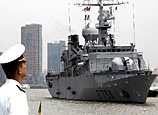
Japan is a different case.
Yonhap quoted the Korean Central News Agency comments posted on April 12 that, as Japan deploys Patriot missiles and Aegis radar-equipped destroyers in response to reports that North Korea may be preparing a missile launch, North Korea said if Japan makes the slightest move, the spark of war “will splash Japan first.”
On April 14, immediately after Kerry arrived in Japan, he held talks and a joint press conference with Japanese Foreign Minister Fumio Kishida. Kerry pointed out that the consolidated alliance between the United States and Japan is unprecedented. The United States and Japan will jointly respond to the North Korean issue, adhere to the position of the denuclearization of the Korean Peninsula, and the United States will fully assist in the defense of Japan.
Win- win
Financial Times wrote that, in a broader perspective, Kerry’s tour will be a window, and people can carefully look for clues of his view on the Obama administration’s strategy to "return to the Asia-Pacific” through the trip.
Some analysis even pointed out that Kerry’s East Asian trip is not for score on the North Korean issue, but rather lies in to establish a good relationship with China.
As the first trip of the top U.S. diplomat, Kerry’s East Asian tour is seen as the weathervane of the Sino-US relations.
The BBC website report cited Chinese President Xi Jinping’s words, saying the relationship between the two countries was "at a new phase and on a good footing". In addition, Chinese Foreign Minister Wang Yi talked with visiting Kerry, and mentioned the recent talk of President Xi Jinping with President Obama on the phone, and the two sides confirmed to continue to promote building partnership, as well as to explore building a new type of relations between big powers.
In U.S. politics, Kerry has been regarded as “knowledgeable about China”or even "pro-Chinese ". In his nomination hearing, Kerry expressed concerns of the United States to "return to the Asia-Pacific” strategy, pointing out that the increase of garrison in the Asia-Pacific will make Chinese people believe that the United States is containing China. However, as many analysts said that despite Kerry’s mild attitude, after the first term, the Obama administration has basically formed its policy toward China, and there will be continuity in the second term.
US Treasury Secretary Jacob Lew’s two-day visit to China in March has opened the prelude the Sino-US high-level contacts between the new governments. This time, Kerry proposed, the United States wants a "strong, normal and special" relationship with China as the Asian country is a great power with great ability to advance the world, and "we need to work together to do that."
Experts say that China and the United States reached a consensus on many issues, but the "road map" of the future of Sino-US relations lies in how to implement the consensus.
Read the Chinese version: 克里東亞行:為何而來?, source: People's Daily, author: Zhong Sheng

















 China's weekly story
China's weekly story
(2013.4.8-4.12)


![]()
